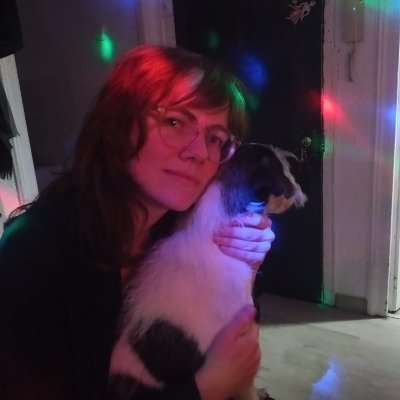#protolang6 검색 결과
In case you couldn't come, this is the poster I presented yesterday at #Protolang6 with Ljiljana Progovac. We argue that language macrovariation can be in part a byproduct of the evolutionary changes that brought about modern languages, with #selfdomestication playing a key role

Great talk by Robert Barton arguing for the importance of the cerebellum in language evolution #Protolang6

Marie Bourjade reminds us that gesture Vs vocalisation first discussions neglect how multimodal language actually is #Protolang6

Today's first #protolang6 plenary is by Tania Kuteva (with Bernd Heine) on grammaticalization and how we can use it to go back in time to think about the evolution of grammar.

Really proud to see our paper "Modeling self-domestication and its impact on language evolution: playing with ‘play’" (with @ToyaGenta, Takashi Hashimoto and Yasuaki Kai) accepted as a regular paper for the forthcoming #Protolang6 conference

Very cool to see that multimodal communication research is gaining momentum in comparative biology just like in linguistics #protolang6

Rafael Núñez is interested in behaviour that requires enculturation, the gradual acquisition of a culture's norms. In humans usually acquired via linguistic learning during ontogeny. #protolang6

@thematzing and Magdalena Schwarz (w/ Niki Ritt) ask how we decide whom to trust. Usually trust is based on social similarity with the premises of more trust in ingroups members and the recognition of ingroup members. #protolang6

Cool to see Michael Spranger mention geocentric spatial referencing systems in his talk in the agent-based modelling symposium. #protolang6

Stuart Semple tested Zipf's Law in non-human primates and found it in macaque calls. The most frequent calls are shorter. Evidence for selection for efficiency of coding. #protolang6

@lucsteels identifying puzzles that we should work on by trying to create mechanistic models that show their emergence. #protolang6

Tao Gong is presenting work on perceptual constraints on color categories. #protolang6 This is addressing the debate over whether color terms are shaped by perceptual constraints or socio-cultural transmission.

In her @NakedPrimate stresses that when we study primate communication, we should look at what language is 'for', since just looking at the repertoires of ape communication won't tell us why only humans have it. #protolang6

Bruno Galantucci is challenging the assumption that humans communicate assuming that their informational exchanges are faithful. #protolang6

Here at #protolang6 @marcel_ruland is enlightening us all on his super cool, innovative agent based model on the evolution of language and how reduced aggression may have impacted communication dynamics. Slaying it!!!

João Zilhão at #protolang6 made a compelling case for Neanderthal smarts and against stubbornly holding on to distinctions that cannot be upheld anymore, especially with this unquestionable photographic proof!

@Limor_Raviv is presenting experimental evidence that social structure affects linguistic structure #protolang6

Stefan Hartmann @hartmast raising the terminological issue issue of the conflation/confusion between language change and language evolution #protolang6

Wanna watch Magdalena Schwarz's and my talk on how language can function as a source of trust at #Protolang6 ? Check it out here! youtube.com/watch?v=IRifHo… Already looking forward to @protolang7 in Düsseldorf!
The fascinating #Protolang6 plenary by @NakedPrimate is also online now, as are the plenaries by Luc Steels, Tetsuro Matsuzawa, Roslyn Frank, and Alexandre Castro-Caldas. And don't forget to submit to #Protolang7: blogs.phil.hhu.de/protolang7/cal…
If you missed out on #Protolang6 in Lisbon, you can now see some of the talks online youtube.com/user/appeellis… (e.g. by @jonasnoelle @Limor_Raviv @symbolicstorage @Nicolas_Fay @Iconiklas and many others). Also, don't forget to submit to #Protolang7 @protolang7 (Deadline: Feb 15)
If you missed out on #Protolang6 in Lisbon, you can now see some of the talks online youtube.com/user/appeellis… (e.g. by @jonasnoelle @Limor_Raviv @symbolicstorage @Nicolas_Fay @Iconiklas and many others). Also, don't forget to submit to #Protolang7 @protolang7 (Deadline: Feb 15)
Lots of great talks happened at #ProtoLang6! Thanks to all of you for tweeting from the conference! Conference site: sites.google.com/view/protolang… General site: protolang.org

Hope to see everyone from #Protolang6 there! Don't forget to submit! (And don't start too late, this ain't your average abstract - they are basically micro-papers; see here for nice examples: evolang.org/torun/proceedi…)
Only two days left to submit abstracts for EvoLang 2020 in Brussels! evolang.org/submissions
The idea is that intelligence is more than just cognitive intelligence and the collection of facts and knowledge. Intelligence is also expressed in our relation with the outside world. #Protolang6
Prof. Ana Margarida Abrantes now, talking about "Cultural Intelligence". This is defined as "an individual's capability to function and manage effectively in culturally diverse situations and settings". It is emotional, social and cultural. #Protolang6 onlinelibrary.wiley.com/doi/full/10.11…
To summarize, the potential and promise of artificial intelligence is amazing, but we need to be careful of "power without enough intelligence". See this fascinating conversation with @pmddomingos: #Protolang6 gigaom.com/2017/12/04/voi…
What what the risks of artificial intelligence? First, it can be manipulated (who has the data, who has the technology). Second, it can get out of control (like in this case: independent.co.uk/life-style/gad…) These risks already exist. #Protolang6
Recently, researchers showed that honey bees and zebra fish can be connected via robotic devices: two species that typically do not communicate can agree and converge on a shared decision with the mediation of robots. Wow. Watch the video here: #Protolang6 youtube.com/watch?v=GJGFhA…
Since 2013, there is also a surge in work on brain to brain communication: we can connect people to each other! This is currently non-invasive, but in the future we can see paraplegic people using implants to control robotic arms. #Protolang6 journals.plos.org/plosone/articl…
An interesting project is "Society 5.0'", introduced by the government of #Japan. The idea is to create a cyber-psychical-social space where humans are integrated with devices: using #AI as complementary to humans via brain-computer interfaces #Protolang6 ieeexplore.ieee.org/abstract/docum…
According to Correia, an intelligent device/entity is a system that, given a large amount of data, can identify knowledge gaps and pose intentional questions, and can then learn about those gaps and about the psychical world #Protolang6
#AI suggests that yes, it is possible to develop intelligence even without sensors.. Also, we already have devices with different types of sensors: smartphones, autonomous cars, etc. How would intelligence be like in other forms of embodiment which we are unaware of? #Protolang6
All known forms of intelligence are embodied in autonomous organisms with sensors & actuators in the real-world: natural intelligence is linked to perception and action in the psychical reality. This raises the question: is intelligence possible without embodiment? #Protolang6
We often take #vision for granted, but it's still difficult for robots. Correia argues that artificial vision is still very much behind what evolution has created. But smart people are working on this, and great advances have already been made in just under 10 years #Protolang6
Although #AI already seem advanced, there's still the paradox of motion (Moravec's paradox, 1988): Sensory-motor capabilities require a lot of computation power compared to symbolic reasoning. Locomotion is VERY difficult for robots #Protolang6 youtube.com/watch?v=lULK_e…
Next up is Prof. Luis Correia talking about new forms of intelligence. We start with acknowledging intelligence in other non-human species, who have a sense of an autobiographic self and complex learning abilities. But we quickly move to computers and robots. Yey! #Protolang6
In case you couldn't come, this is the poster I presented yesterday at #Protolang6 with Ljiljana Progovac. We argue that language macrovariation can be in part a byproduct of the evolutionary changes that brought about modern languages, with #selfdomestication playing a key role

Really proud to see our paper "Modeling self-domestication and its impact on language evolution: playing with ‘play’" (with @ToyaGenta, Takashi Hashimoto and Yasuaki Kai) accepted as a regular paper for the forthcoming #Protolang6 conference

Rafael Núñez is interested in behaviour that requires enculturation, the gradual acquisition of a culture's norms. In humans usually acquired via linguistic learning during ontogeny. #protolang6

Núñez presents fascinatingly complex graph on differences between types of quantification and who has them, based on this paper: sciencedirect.com/science/articl… (paywalled) #protolang6

Marie Bourjade reminds us that gesture Vs vocalisation first discussions neglect how multimodal language actually is #Protolang6

Very cool to see that multimodal communication research is gaining momentum in comparative biology just like in linguistics #protolang6

When do we use self-pointing? Not only for "I" but also for "We", "our society", "in the usa" etc! #protolang6

Great talk by Robert Barton arguing for the importance of the cerebellum in language evolution #Protolang6

@lucsteels identifying puzzles that we should work on by trying to create mechanistic models that show their emergence. #protolang6

Today's first #protolang6 plenary is by Tania Kuteva (with Bernd Heine) on grammaticalization and how we can use it to go back in time to think about the evolution of grammar.

Great slide by Zilhão on evidence for controlled fires in Neanderthals. Some researchers claims Neanderthals were opportunistic fire users but the evidence shows clear signs of intentional fire-making #protolang6

I love the fact that Sinha refers to the work of Karl Bühler -whose work is critically underreceived - and his model of communication (+joint attention added) as being highly relevant for today #protolang6

Something went wrong.
Something went wrong.
United States Trends
- 1. Bears 52.5K posts
- 2. Falcons 24.2K posts
- 3. Josh Allen 19.7K posts
- 4. Bryce Young 8,340 posts
- 5. JJ McCarthy 9,606 posts
- 6. Chargers 19.6K posts
- 7. Vikings 27.2K posts
- 8. Packers 37.9K posts
- 9. Bengals 21.4K posts
- 10. Bucs 12.1K posts
- 11. #KeepPounding 3,967 posts
- 12. Panthers 19.5K posts
- 13. Bills 110K posts
- 14. Hyatt 3,898 posts
- 15. Ramsey 8,025 posts
- 16. Sean Tucker 3,618 posts
- 17. Steelers 34.8K posts
- 18. Raheem 4,783 posts
- 19. #GoPackGo 5,485 posts
- 20. Jameis 12.6K posts



















